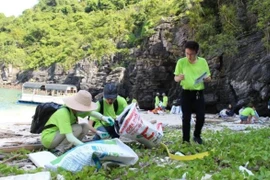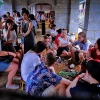Da Nang (VNS/VNA) - A total 11.7 tonnes of garbage including 0.7 tonnes of plastic waste have been collected for classification at source, while 1,200 teachers and 24,000 primary school students at 20 schools in the central city of Da Nang took part in a pilot project to make their schools greener.
A report on the pilot project, under the theme 'Clean Cities, Blue Ocean', funded by USAID's flagship programme, which aims to combat ocean plastic pollution, has been released after eight months of operation.
The programme is now being rolled out to different schools, including secondary and high school levels.
More than 2,000 educational sessions and 65 events showing ways to treat waste along with the 3Rs (reduce, re-use and recycle) were organised to raise awareness among school students, teachers and the community, along with big pushes on social media.
Tran Mai Trang, from the Live&Learn centre, said the programme had helped reduce by 17% the amount of waste released into the environment, while also collecting valuable organic waste for composting.
“The programme introduced effective solutions in management of waste at school – an initial step to approach to ‘zero waste’ goal in the future. School students are aware of the importance of waste classification and environment protection by actions,” she said.
“Some schools included waste audits and waste reduction activities as part of their daily action programme. Glass bottles and LED screens were used instead of plastic containers and backdrops, respectively,” she said.
Students were encouraged to bring food boxes and bottles to school rather than using single-use plastic ware, she added.
According to the report, the programme collected 5.9 tonnes of organic waste, 5.8 tonnes of waste (paper, cans, metal) for recycling and 630kg electronic waste.
The programme will now be rolled out to most of the other schools throughout the city, towards building Da Nang as a ‘green’ school brand in central Vietnam and a key example for other provinces and cites to follow.
The Tran Dai Nghia Primary School was the first in the city to pilot the waste treatment plans under the Waste-Free Schools model of the Building Healthy City (BHC) programme – one of East Meets West Organisation's key programmes in building a healthy and clean study environment for 12 primary schools.
The school applied a recycling kitchen system to reduce 60% of waste every month, saving 43 USD in garbage treatment fees, while producing 100kg of nutritional compost each month.
According to experts from Da Nang University, 80% of the daily 1,100-tonne waste in Da Nang could be recycled by promoting waste classification at source.
At least 400 tonnes of organic waste, of which 50% was biodegradable, could be collected by recycling sorting every day.
Lagom Vietnam Company and TetraPak said ten tonnes of milk cartons from schools in Da Nang are available for collection for recycling every day./.
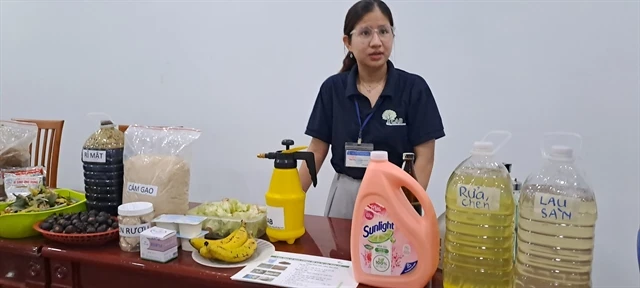
See more

Vietnam urged to embrace alternatives to plastics for sustainable future
A research group from the Institute of Strategy and Policy on Natural Resources and Environment under the Ministry of Natural Resources and Environment (MoNRE) is sounding the alarm on Vietnam's plastic waste crisis and advocating for a transformative shift towards sustainable alternatives.
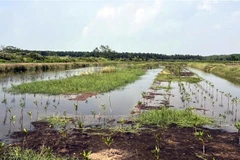
Project helps restore mangrove forests through nature-based solutions in Soc Trang
The Department of Agriculture and Rural Development of Soc Trang province, in collaboration with the International Union for Conservation of Nature (IUCN) and the Coca-Cola Foundation, organised a conference on January 16 to launch a project on increasing the coastal resilience of the Mekong Delta through mangrove restoration and nature-based solutions in the province.
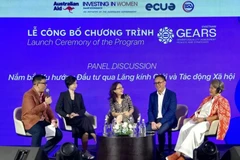
Programme supports businesses in practicing ESG
A programme was launched in Ho Chi Minh City on January 16 to support businesses in Vietnam in measuring and implementing comprehensive ESG (Environmental, Social and Governance) practices in human resources management to improve their competitive edge in the global supply chain.
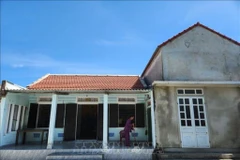
Vietnam, UNDP fortify coastal communities against climate change
Over 25,000 Vietnamese residents in seven coastal localities are now safeguarded by storm-and flood-resistant homes thanks to a project on improving resilience of vulnerable coastal communities to climate change in Vietnam.
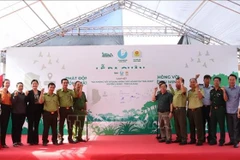
Ca Mau takes stand against illegal wildlife use
A campaign against the illegal use of wildlife was launched by the People's Committee of U Minh district in the Mekong Delta province of Ca Mau in collaboration with the Save Vietnam's Wildlife (SVW) on January 14.
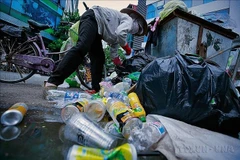
Policy reform – paramount in Vietnam’s plastic waste reduction: experts
Dr Nguyen Trung Thang and a research team from the Institute of Strategy and Policy on Natural Resources and Environment have proposed a three-pronged approach that combines policy reform, market incentives and public awareness improvement to combat Vietnam’s growing plastic waste crisis.
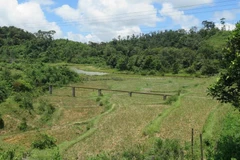
4.2 magnitude quake strikes Kon Tum province
A 4.2-magnitude earthquake jolted Kong Plong district in the Central Highlands province of Kon Tum on early January 9 morning, according to the Vietnam Earthquake Information and Tsunami Warning Centre under the Institute of Geophysics.
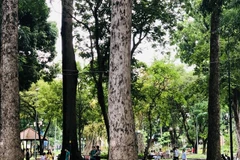
HCM City strives to have one square metre of green space per capita by 2030
Ho Chi Minh City has set a target of achieving at least one square metre of green space per capita and an additional ten hectares of public green areas by 2030.
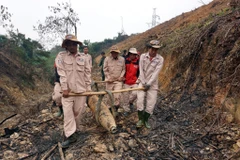
Over-220kg bomb with intact fuse safely handled in Quang Binh
The Mines Advisory Group (MAG) in Vietnam confirmed on January 4 that its experts and mobile bomb disposal team have safely handled and moved a bomb weighing over 220 kg to a secure storage area in the central province of Quang Binh, where it will await safe detonation.
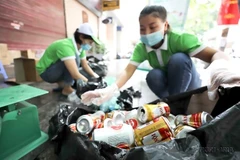
Classifying solid waste at source mandatory from January
Domestic solid waste must be classified at each household from the beginning of this year, according to the Law on Environmental Protection 2020, which is considered a breakthrough step towards turning waste into resources.
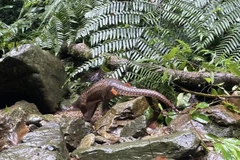
Twelve Javan pangolins released back to nature
The Cuc Phuong National Park in the northern province of Ninh Binh, in collaboration with the Save Vietnam's Wildlife (SVW), successfully released 12 Javan pangolins (Manis Javanica) back into the wild on January 2.
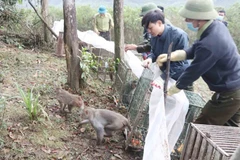
Ha Tinh: 90 wild animals released back to nature
Authorities have released 90 wild animals of 14 species into Vu Quang National Park in the central province of Ha Tinh.
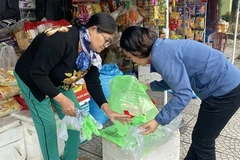
Ancient town leads waste management in central Vietnam
The ancient town of Hoi An has become a trailblazer in waste management, leading the way in waste separation at source and tackling the over reliance on plastic.

Go Green University network promoted nationwide
The University of Economics Ho Chi Minh City (UEH) and the Vingroup Future Green Fund launched the “Let’s Green Unitour” programme to expand the green university model to 10 higher education institutions nationwide.
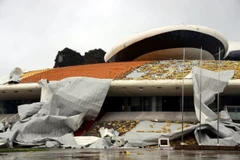
Centre to apply AI to tropical cyclone forecasting
The Hanoi University of Science and Technology's Institute for Research and Application of Artificial Intelligence, alongside relevant units, has been told to work closely with the National Centre for Hydro-Meteorological Forecasting (NCHMF) to integrate artificial intelligence (AI) into the forecasting of tropical cyclones ahead of the 2025 rainy and storm season.
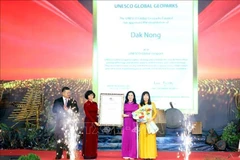
Dak Nong receives UNESCO global geopark title for second time
The Central Highlands province of Dak Nong celebrated the second conferment of the UNESCO global geopark title for its geopark at a ceremony organised by the provincial People’s Committee on December 26 evening.
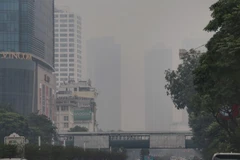
Hanoi targets 80% of days with good or moderate air quality annually
Hanoi has set a target to ensure that up to 80% of the days in a year have air quality index (VN-AQI) levels rated as good or moderate, based on data from standard national and city monitoring stations, according to the director of the city’s Department of Natural Resources and Environment, Le Thanh Nam.
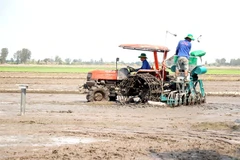
Vietnam aims to reduce greenhouse gas emissions in agriculture production
The transformation of agricultural production towards ecological, organic, circular and low-emission agriculture is a top priority as Vietnam seeks to meet its goal of achieving net-zero emissions by 2050, experts said.

Dong Thap revives red-crowned crane population
In a bid to save its iconic symbol, the Mekong Delta province of Dong Thap is embarking on a conservation and development scheme for the critically endangered red-crowned cranes at the Tram Chim National Park for the 2022–2032 period.

Thua Thien-Hue launches projects to enhance climate change adaption, resilience
The People's Committee of Thua Thien-Hue province, in collaboration with the Luxembourg Development Cooperation Agency, on December 19 launched two climate adaptation projects with a combined budget of 12 million USD.
